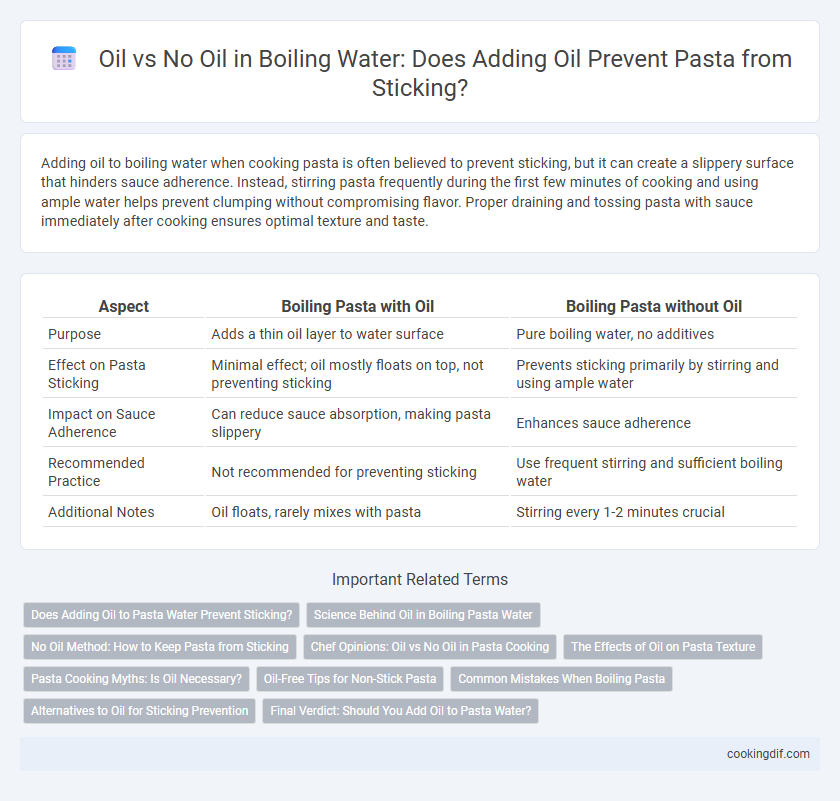Adding oil to boiling water when cooking pasta is often believed to prevent sticking, but it can create a slippery surface that hinders sauce adherence. Instead, stirring pasta frequently during the first few minutes of cooking and using ample water helps prevent clumping without compromising flavor. Proper draining and tossing pasta with sauce immediately after cooking ensures optimal texture and taste.
Table of Comparison
| Aspect | Boiling Pasta with Oil | Boiling Pasta without Oil |
|---|---|---|
| Purpose | Adds a thin oil layer to water surface | Pure boiling water, no additives |
| Effect on Pasta Sticking | Minimal effect; oil mostly floats on top, not preventing sticking | Prevents sticking primarily by stirring and using ample water |
| Impact on Sauce Adherence | Can reduce sauce absorption, making pasta slippery | Enhances sauce adherence |
| Recommended Practice | Not recommended for preventing sticking | Use frequent stirring and sufficient boiling water |
| Additional Notes | Oil floats, rarely mixes with pasta | Stirring every 1-2 minutes crucial |
Does Adding Oil to Pasta Water Prevent Sticking?
Adding oil to pasta water does not prevent sticking effectively because oil floats on the surface and rarely mixes with the water or pasta. Sticking is best avoided by using ample water and stirring the pasta frequently during the first few minutes of cooking. Proper water-to-pasta ratio and stirring play crucial roles in preventing clumping and ensuring even cooking.
Science Behind Oil in Boiling Pasta Water
Adding oil to boiling water when cooking pasta creates a hydrophobic barrier on the surface of the water, which reduces the surface tension and prevents pasta strands from sticking together. However, scientific studies show that oil tends to float on top of the water and does not significantly penetrate the pasta, meaning it mainly prevents water from foaming rather than effectively reducing stickiness. Instead, frequent stirring and using adequate water volume are more efficient methods to keep pasta strands separate during boiling.
No Oil Method: How to Keep Pasta from Sticking
Boiling pasta without oil helps keep the sauce adhere better by preventing a slippery surface on the noodles. Stirring frequently during the first two minutes of cooking is essential to separate the pasta and avoid clumps. Using plenty of salted water ensures proper cooking texture while minimizing sticking without the need for oil.
Chef Opinions: Oil vs No Oil in Pasta Cooking
Many chefs argue that adding oil to boiling water is unnecessary for preventing pasta from sticking because stirring and using sufficient water are more effective methods. Some culinary experts caution that oil can coat the pasta, hindering sauce absorption and altering texture. Renowned chefs like Jamie Oliver emphasize proper stirring over oil, advocating for technique rather than additives in achieving perfect pasta.
The Effects of Oil on Pasta Texture
Adding oil to boiling water can create a thin coating on pasta, reducing surface stickiness but also preventing sauce absorption and altering texture. Without oil, pasta tends to stick initially but achieves a better bite and allows sauces to adhere more effectively. The overall texture of pasta is firmer and more palatable when cooked without oil in the water.
Pasta Cooking Myths: Is Oil Necessary?
Adding oil to boiling water during pasta cooking is a common myth believed to prevent sticking; however, it is not necessary as proper stirring and adequate water volume are more effective methods. Oil tends to float on the water surface and does not prevent pasta from sticking together but may cause sauce adhesion issues later. Culinary experts recommend using plenty of boiling water and frequent stirring to ensure perfectly cooked, non-sticky pasta without the need for oil.
Oil-Free Tips for Non-Stick Pasta
Boiling pasta without oil prevents the sauce from sliding off by allowing better sauce adhesion to the noodles. Stir pasta frequently during the first two minutes of cooking to keep strands separate and avoid clumping. Using plenty of water and a large pot also helps maintain a rolling boil, reducing the chance of pasta sticking together.
Common Mistakes When Boiling Pasta
Adding oil to boiling water is a common mistake when cooking pasta, as it prevents sauce from adhering properly by creating a slippery surface. Instead, stirring the pasta frequently in the first few minutes of boiling helps prevent sticking effectively. Using a large pot with plenty of water also reduces the chances of pasta clumping together.
Alternatives to Oil for Sticking Prevention
Adding oil to pasta boiling water is commonly believed to prevent sticking, but it can reduce sauce adhesion. Alternatives such as consistently stirring the pasta, using ample water, or adding salt create a better environment for preventing clumping. Techniques like rapidly bringing water to a boil before adding pasta and rinsing with cold water after cooking also effectively reduce sticking without compromising texture or flavor.
Final Verdict: Should You Add Oil to Pasta Water?
Adding oil to pasta water does not prevent sticking but creates a slippery surface that hinders sauce adhesion, reducing flavor absorption. Proper pasta cooking techniques like using plenty of water, stirring frequently, and salting the water are more effective in preventing pasta from sticking. The final verdict: avoid oil in boiling water to maintain optimal texture and sauce compatibility.
Oil vs no oil in boiling water for sticking Infographic

 cookingdif.com
cookingdif.com